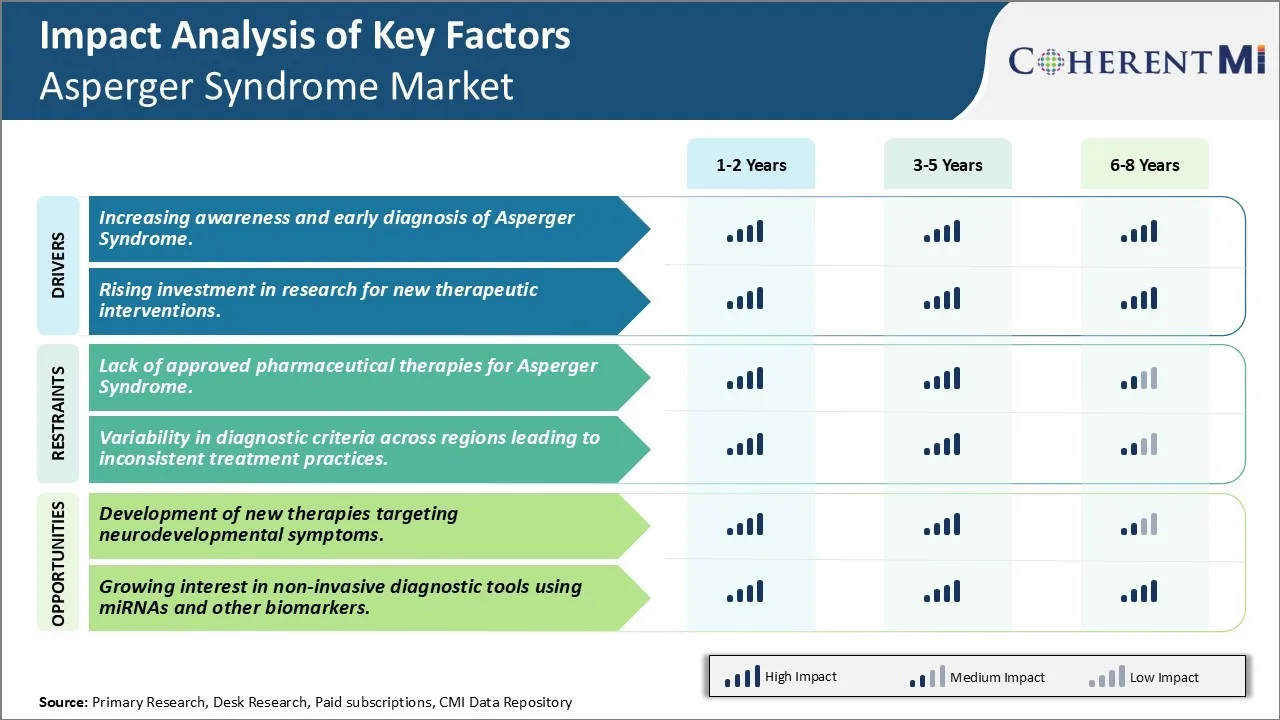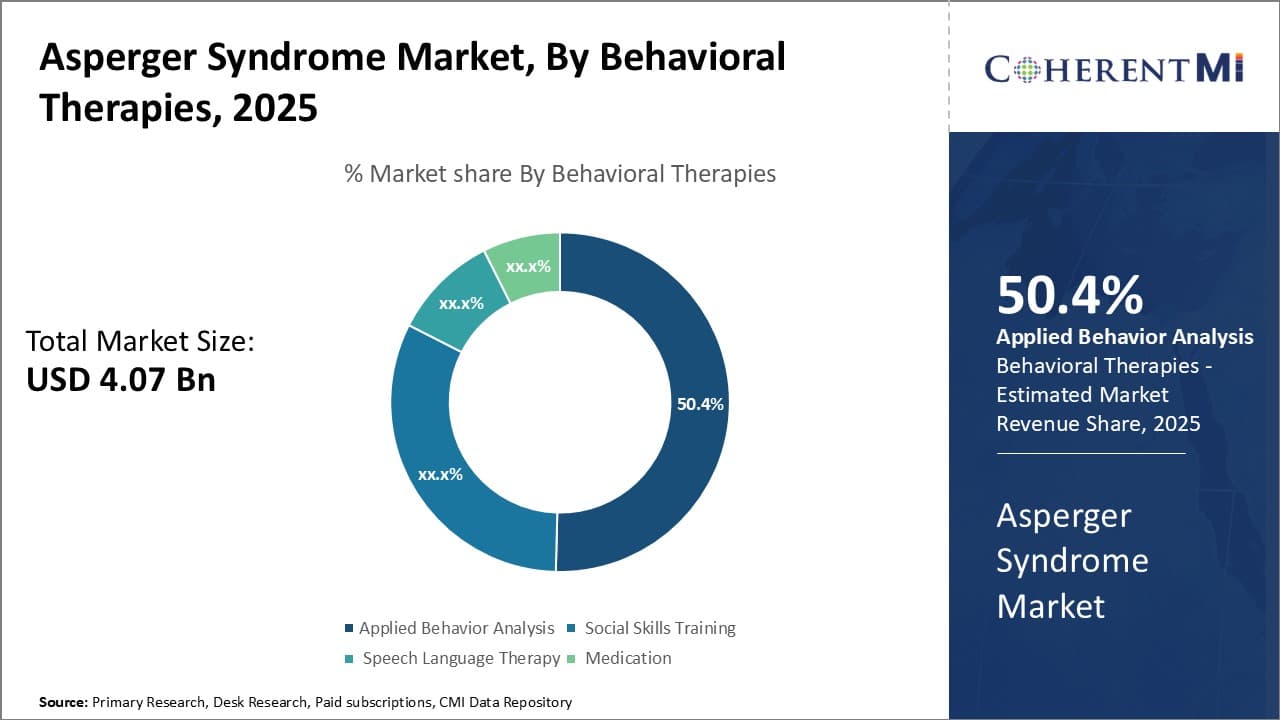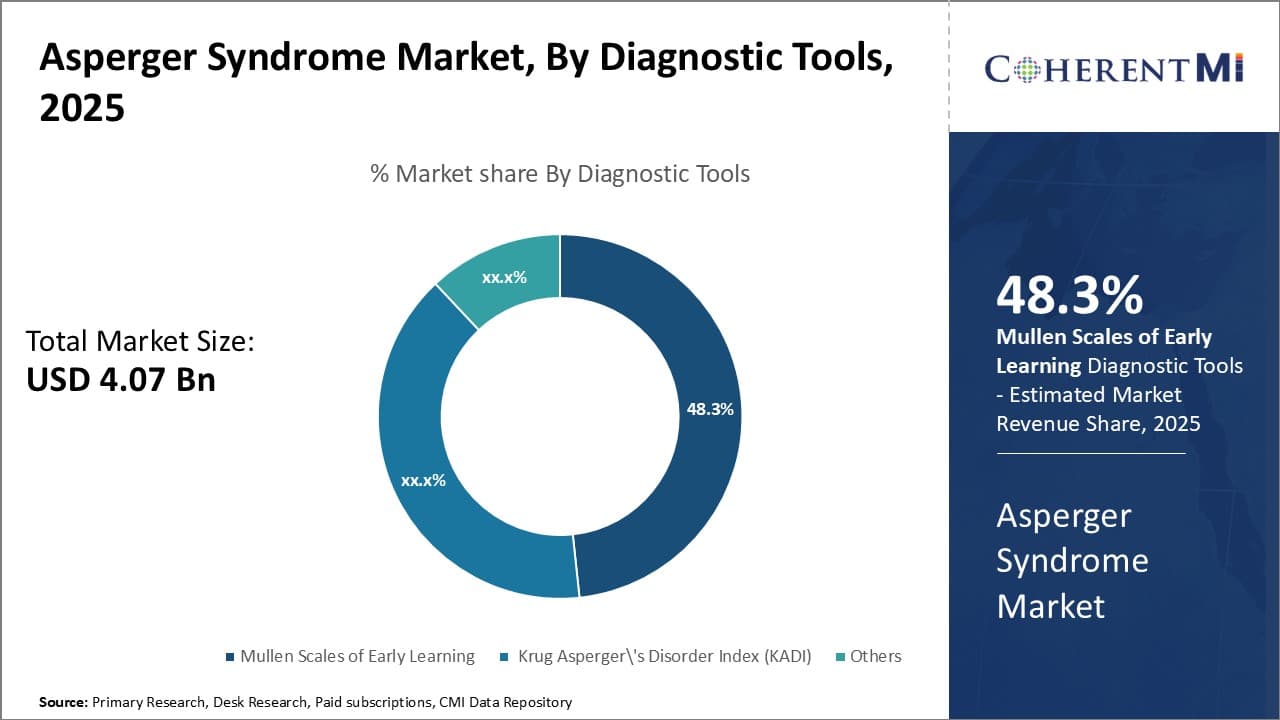Asperger Syndrome Market Size - Analysis
The Global Asperger Syndrome Market is estimated to be valued at USD 4.07 Bn in 2025 and is expected to reach USD 5.46 Bn by 2032, growing at a compound annual growth rate (CAGR) of 4.3% from 2025 to 2032. This represents significant growth over the forecast period, which can be attributed to rising diagnosis rates and improving awareness about the condition among patients and healthcare providers.
The market is expected to witness positive growth over the next few years. There is an increasing focus on the development of effective treatment options and interventions for patients diagnosed with Asperger Syndrome. Several pharmaceutical companies and biotech startups are investing in research and development of targeted drugs and therapies. Furthermore, advancements in genetic testing and biomarkers are also likely to aid in earlier diagnosis and personalized treatment regimens.
Market Size in USD Bn
CAGR4.3%
| Study Period | 2025-2032 |
| Base Year of Estimation | 2024 |
| CAGR | 4.3% |
| Market Concentration | Low |
| Major Players | Hoffmann-La Roche, SymTrend Inc., Forest Laboratories, Bristol-Myers Squibb, CogCubed Corp. and Among Others |
please let us know !
Asperger Syndrome Market Trends
Market Driver - Increasing Awareness and Early Diagnosis of Asperger Syndrome Encourages the Patients.
With growing information available on Autism Spectrum Disorder and conditions within it such as Asperger syndrome, awareness about the developmental condition has been rising significantly over the past decades. Several organizations and advocacy groups are actively working towards educating public as well as healthcare practitioners to recognize signs and symptoms of autism at an early stage. This is enabling more children with mild autism traits to get assessed and receive an official diagnosis of Asperger syndrome, which was earlier being commonly missed as their social limitations and repetitive behaviors were not very apparent.
Early intervention plays a very vital role in helping children with autism reach their full potential. With therapies and supports starting at a younger age, outcomes are much better as brain develops plasticity at that stage. Timely diagnosis allows affected individuals to get special education services in school setting as well as work with speech and occupational therapists to improve their communication. This fuels their social skills and makes coping with everyday tasks easier. Many support groups also suggest that acknowledging the condition formally through diagnosis provides clarity to family and the individual themselves about what they are experiencing. It reduces confusion and chances of misdiagnosis of associated conditions.
Governments of many countries are also working to enhance screening and train primary care providers for red-flagging autism symptoms a lot earlier. Early identification rate of autism is on a rise globally due to combined effort of medical community and supporting organizations. This driver indicates that with enhanced consciousness, more Asperger syndrome cases will come forward for diagnosis and management, thereby propelling growth in the relevant market.
Market Driver - Rising Investment in Research for New Therapeutic Interventions Hosts in Developing Targeted Drugs.
There remains a lot which is still unknown in the field of autism research. Clinical studies are dedicatedly being performed to develop more effective behavioral and medical methods of treatment for improving life challenges associated with the neurodevelopmental disorder. Global organizations as well as private sector players are generously funding research programs to evaluate new treatment targets and protocols. A key focus remains on discovering safe and targeted pharmaceutical interventions which can help reduce core symptoms and associated conditions. Cell-based and genetic research exploring roots of autism is another priority area attracting major grants.
Several drug development firms have been screening compounds and taken a few candidates into clinical trials over the past few years. Although no approved medications exist as of now, few studies have indicated promising results for some molecules in managing repetitive behaviors and social awkwardness. Researchers are optimistic that ongoing research efforts will yield effective drug therapies to improve quality of life of people on the spectrum in future. Apart from medicines, there is exploration around other adjunctive novel techniques like hyperbaric oxygen therapy, auditory integration training and neurofeedback for specific behavioral issues.
Government agencies have been allocating higher amounts for supporting innovative research projects through grants and institutes. Donations from philanthropic foundations have also witnessed a rise. This augurs well for the Asperger syndrome market since new evidence-based interventions getting established will bolster service demand. The driver of intensifying efforts in autism therapeutics development worldwide is likely to fuel overall growth in the relevant industry.
 To learn more about this report, Download Free Sample Copy
To learn more about this report, Download Free Sample Copy
Market Challenge - Lack of Approved Pharmaceutical Therapies for Asperger Syndrome Inhibits the Growth.
One of the key challenges faced in the Asperger Syndrome market is the lack of approved pharmaceutical therapies that can effectively address the core symptoms of the disorder. While some off-label medications are sometimes used to help manage individual symptoms like anxiety, depression, or focus issues, there are no drugs that are approved by regulatory agencies specifically for treating the social and communication deficits that define Asperger's. Pharmaceutical companies have struggled to develop medications that can successfully target the underlying neural mechanisms involved in these neurodevelopmental symptoms. Most clinical drug trials in the past have failed to prove efficacy over placebo controls. This leaves families and individuals with limited medical options beyond psychosocial therapies and lifestyle management. The lack of an approved pharmacological treatment also presents challenges for providers in terms of treatment planning and measuring clinical outcomes. Overall, the inability to provide customized pharmaceutical interventions is a major limitation in addressing the needs of the patients.
Market Opportunity: Development of New Therapies Targeting Neurodevelopmental Symptoms.
The development of novel therapies that can more directly target the core neurodevelopmental symptoms of Asperger Syndrome presents a major commercial opportunity. Advances in areas such as genetics, neuroimaging, and personalized medicine are improving the understanding of the biological underpinnings of conditions like autism spectrum disorder. This growing body of research on the role of genes, brain connectivity patterns, and biomarkers could enable the development of medications designed to treat specific impairments in social reciprocity, communication, and restricted or repetitive behaviors. Successful clinical trials of drugs or other biologics that demonstrate efficacy in improving these core deficits would fill an important unmet need. A therapy able to gain regulatory approval as a first-line medical treatment for the syndrome could achieve significant market penetration. Pharmaceutical companies investing in research focused on pathways, circuits, and biomarkers relevant to socio-communication and neuroplasticity have the potential to develop novel therapies with widespread applications across the autism spectrum.
Prescribers preferences of Asperger Syndrome Market
Asperger syndrome is typically treated through a multidisciplinary approach involving medication, therapies and educational support. First-line therapeutic options aim to manage associated symptoms and behaviors. For mild cases, psychotherapy is often recommended to help with social and communication skills. Prescribers commonly suggest cognitive behavior therapy (CBT) delivered by specialized therapists.
If symptoms are moderate, prescribers may prescribe selective serotonin reuptake inhibitors (SSRIs). Familiar SSRIs prescribed include Lexapro (escitalopram) and Zoloft (sertraline), as they can help reduce anxiety. For severe irritability and aggression, second-generation antipsychotics like Abilify (aripiprazole) may be tried. These powerful drugs require careful monitoring for side effects.
Educational accommodations are a mainstay of managing Asperger syndrome. Individualized education programs (IEPs) help deliver lessons catering to specific needs. Speech therapy aids with speech difficulties, while occupational therapy addresses issues like sensory processing. Social skills training through roleplaying teaches understanding others' perspectives and initiating/maintaining conversations.
The therapy or medication chosen, as well as education plan framed, depends on symptoms, their severity, comorbid conditions, age and preferences. A multidisciplinary care team comprising psychiatrists, pediatricians, psychologists and therapists coordinates the different treatment components. Monitoring progress regularly allows tailoring interventions for optimal management over the long-term.
Treatment Option Analysis of Asperger Syndrome Market
Asperger Syndrome treatment focuses on addressing symptoms and making life easier through supportive therapies and accommodations. Treatment is tailored based on the individual's needs and severity of symptoms.
Mild to moderate cases often respond well to educational and social skills training programs. These aim to improve communication, emotional regulation, and social skills. Cognitive Behavioral Therapy (CBT) is also effective by helping manage anxiety, depression, and obsessive behavior through identifying and modifying harmful thought patterns.
For severe symptoms, medication may be considered. Selective Serotonin Reuptake Inhibitors (SSRIs) like fluoxetine are prescribed to treat anxiety, depression and obsessive behavior. These increase serotonin levels in the brain and have fewer side effects than older antidepressants. They are usually well-tolerated but require 4-6 weeks to take effect.
Speech and occupational therapy can aid language development and daily living skills. Coordinated multi-pronged treatment combining CBT, social skills training, education accommodations, and medicinal support as needed, leads to the best outcomes by managing a wide range of symptoms.
Long-term management concentrates on increasing independence using individualized coping strategies. It also focuses on maintaining social and community involvement through vocational assistance and counseling as needed well into adulthood. Coordination between clinicians, caregivers, patients and their support system is essential for optimal symptom control and quality of life.
Key winning strategies adopted by key players of Asperger Syndrome Market
Focus on Awareness and Advocacy: Many leading organizations such as Autism Speaks and Asperger/Autism Network (AANE) have effectively used awareness campaigns to educate the public and reduce stigma around Asperger Syndrome. Autism Speaks launched many national initiatives since 2006 such as Light It Up Blue to raise autism awareness. This helped reduce social isolation faced by those with Asperger Syndrome.
Target Therapy Development: Major pharmaceutical companies have invested heavily in research and clinical trials to develop more effective therapies and novel drugs. One such drug is Aurite, a targeted treatment for core symptoms of autism which showed reduction of repetitive behavior in phase 2 trials. If approved, it can be a breakthrough in Asperger Syndrome management.
Focus on Assistive Technologies: Startups like BrainPower and Cognoa are developing AI/VR based assistives to help those with Asperger Syndrome cope with social challenges and daily living skills. BrainPower's neurofeedback system won the 2020 CES Innovation Award for using brain monitoring to teach social & emotional skills. Investments in such startups allowed companies like IBM to capitalize on a USD26 billion global market for autism support tools.
Partner With Advocacy Non-Profits: Major companies’ partner with advocacy non-profits to support families impacted by Asperger Syndrome. For example, Microsoft has pledged USD 25 million to Autism Speaks to develop accessible technologies. Such high-profile partnerships boost positive brand image of companies being socially responsible while supporting the cause. The collaboration also helps advocates expand outreach through corporate networks and resources.
Segmental Analysis of Asperger Syndrome Market
 To learn more about this report, Download Free Sample Copy
Insights, By Behavioral Therapies, Acceptance and Standardization Drive Growth of Applied Behavior Analysis.
To learn more about this report, Download Free Sample Copy
Insights, By Behavioral Therapies, Acceptance and Standardization Drive Growth of Applied Behavior Analysis.
By Behavioral Therapies, Applied Behavior Analysis is expected to contribute the highest market share 50.4% in 2025 due to the growing acceptance and standardization of the treatment approach. Applied Behavior Analysis (ABA) uses behavioral principles such as positive reinforcement and punishment to increase behaviors that are helpful and reduce behaviors that are harmful or affect learning. ABA allows for individualized treatment programs tailored to the unique needs of each patient, focusing therapy on learning functional life skills and appropriate behaviors.
A major factor fueling the uptake of ABA is the growing recognition and recommendation of the therapy approach. In recent years, leading health organizations including the American Academy of Pediatrics have endorsed ABA as one of the most effective interventions for autism spectrum disorder. Wider acceptance among mainstream medical practitioners has helped increase diagnosis rates and driven more patients toward ABA programs. Standardized clinical practice guidelines and training certification programs have also helped professionalize ABA services, reassuring patients and families of treatment quality and efficacy.
 To learn more about this report, Download Free Sample Copy
To learn more about this report, Download Free Sample Copy
Insights, By Diagnostic Tools, Diagnostic Standardization Boosts Mullen Scales of Early Learning.
In terms of By Diagnostic Tools, the Mullen Scales of Early Learning is expected to contribute the highest market share 48.3% in 2025 for its standardization and widespread adoption in developmental screening. The Mullen Scales is considered the 'gold standard' assessment for evaluating cognitive and motor abilities in children from birth to 68 months. It uniquely measures five specific developmental domains allowing clinicians to create a comprehensive cognitive and motor profile for each child.
A key driver has been the Mullen Scales' clinical validation and standardization across different populations, improving reliability and consistency in scoring and interpretation. Its norms are based on large samples stratified by variables like gender, geography, and socioeconomic status, ensuring accurate developmental comparisons. The assessment is also less susceptible to evaluator bias compared to less structured diagnostic tools. Widespread clinical training programs have helped foster correct Mullen administration techniques.
Importantly, the Mullen Scales has achieved endorsement from leading medical and psychological associations as a preferred measure for early childhood assessment. Its inclusion in developmental screening guidelines issued by groups like the American Academy of Pediatrics has accelerated adoption rates. As one of the few diagnostics to meet evidence-based criteria for accurate autism identification in toddlers, the Mullen Scales is increasingly utilized for early diagnosis. Its growing preference among evaluators will continue concentrating its share of the diagnostic tools market.
Insights, By End-user, Accessibility and Infrastructure Boosts Hospital Demand.
By End-user, Hospitals contribute the highest share of the Asperger Syndrome market owing to advantages in accessibility, infrastructure, and continuity of care. As frontend points of healthcare access, hospitals allow patients to receive diagnostic evaluations and begin treatment plans in a single integrated setting. Co-location of multidisciplinary specialists streamlines the process from initial concerns to ongoing behavioral and medical management.
Hospital systems have also invested heavily in autism-related programs and centers of excellence with dedicated evaluation suites, therapies, and treatment teams. Inpatient and partial hospital options further expand access for patients requiring intensive therapies or medication adjustments. Consolidation in the hospital industry is concentrating autism resources and clinical trial networks within major city centers.
Perhaps most importantly, hospitals offer the infrastructure for long-term coordinated care through transitions between pediatric and adult providers. Their scale allows for connectivity between in-hospital and community-based services like outpatient clinics and school support programs. Financial models may also better reimburse for the interdisciplinary, multimodal approach often required for persistent conditions like Asperger syndrome. Partnerships between hospitals, insurers, and education/social services will likely deepen to produce more integrated "medical homes" boosting long-run adherence and outcomes.
Additional Insights of Asperger Syndrome Market
Asperger Syndrome is part of the autism spectrum and is characterized by challenges in social interactions, communication difficulties, and repetitive behaviors. The market for Asperger Syndrome is expected to grow as awareness increases and therapeutic interventions become more specialized. Current treatments focus on behavioral interventions like Applied Behavior Analysis (ABA) and social skills training. However, there is a significant unmet need for pharmaceutical interventions. Companies like Hoffmann-La Roche and Bristol-Myers Squibb are working on developing therapies, and advancements in diagnostic tools, particularly involving biomarkers such as miRNAs, are leading to earlier diagnoses. These efforts are expected to improve the management and outcomes for individuals with Asperger Syndrome, enhancing their quality of life.
Competitive overview of Asperger Syndrome Market
The major players operating in the Asperger Syndrome Market include Hoffmann-La Roche, SymTrend Inc., Forest Laboratories, Bristol-Myers Squibb, CogCubed Corp., Obslap Research LLC, Seaside Therapeutics Inc. and Quadrant Biosciences Inc.
Asperger Syndrome Market Leaders
- Hoffmann-La Roche
- SymTrend Inc.
- Forest Laboratories
- Bristol-Myers Squibb
- CogCubed Corp.
Recent Developments in Asperger Syndrome Market
In June 2023, The State University of New York – Upstate Medical University initiated a clinical study focusing on salivary collection and Mullen Scales of Early Learning for detecting miRNAs that differentiate between children with ASD and those without ASD. This research aims to contribute to early diagnosis and intervention, potentially leading to earlier treatment and improved outcomes.
Asperger Syndrome Market Segmentation
- By Behavioral Therapies
- Applied Behavior Analysis
- Social Skills Training
- Speech Language Therapy
- Medication
- By Diagnostic Tools
- Mullen Scales of Early Learning
- Krug Asperger's Disorder Index (KADI) Source
- Others
- By End-user
- Hospitals
- Clinics
- Diagnostic Centers
- Drug Stores
Would you like to explore the option of buying individual sections of this report?
Vipul Patil is a dynamic management consultant with 6 years of dedicated experience in the pharmaceutical industry. Known for his analytical acumen and strategic insight, Vipul has successfully partnered with pharmaceutical companies to enhance operational efficiency, cross broader expansion, and navigate the complexities of distribution in markets with high revenue potential.
